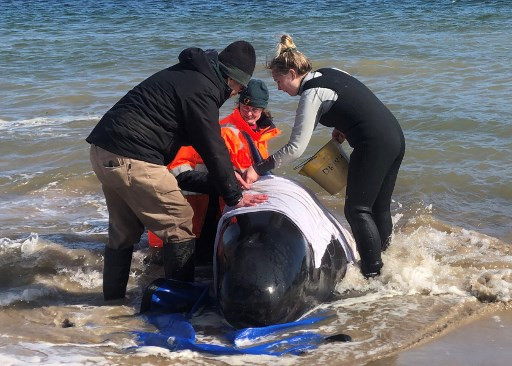Popular Reads
Top Results
Can't find what you're looking for?
View all search resultsPopular Reads
Top Results
Can't find what you're looking for?
View all search resultsHopes fade for more survivors in Australian mass whale stranding
Change text size
Gift Premium Articles
to Anyone
 A handout photo taken on Tuesday and received on Wednesday from Tasmania Police shows people helping a whale in Macquarie Harbor on the rugged west coast of Tasmania, as hundreds of pilot whales have died in a mass stranding in southern Australia despite efforts to save them, with rescuers racing to free a few dozen survivors. (Handout/Tasmania Police/AFP/-)
A handout photo taken on Tuesday and received on Wednesday from Tasmania Police shows people helping a whale in Macquarie Harbor on the rugged west coast of Tasmania, as hundreds of pilot whales have died in a mass stranding in southern Australia despite efforts to save them, with rescuers racing to free a few dozen survivors. (Handout/Tasmania Police/AFP/-)
O
nly a few dozen of the 470 whales stranded on Australia's coast can still be saved, rescuers warned Thursday, as they weighed euthanizing those animals in most distress.
At least 380 pilot whales have died since their ill-fated pod was discovered beached on Tasmania's rugged western seaboard four days ago -- Australia's largest-ever mass stranding.
Around 70 of the creatures have survived and the death toll is expected to rise as the window for rescue now begins to close.
"We've got about 25 animals that we think have the strength to be successfully released," said Tasmania's Parks and Wildlife Service manager Nic Deka, adding the "hard physical yakka [work]" of rescuers would continue until nightfall.
A crew of around 60 conservationists and skilled volunteers have spent days wading in the icy water of Macquarie Harbor, surrounded by the cries of anguished whales slowly dying.
Pilot whales -- which can grow up to six meters long and weigh a tons -- are known to be highly social. Some animals have resisted rescue or tried to return to their family after being freed, becoming beached for a second time.
Such is the level of distress that authorities said they are likely to carry out mercy killings of at least four whales.
"We're actually considering euthanasia at this very moment with a small number of animals that we've attempted to release and it hasn't been successful," said Tasmanian environment department marine biologist Kris Carlyon.
"That's based purely on animal welfare grounds," he said. "It's always something in the back of our minds, we go to it only when needed."
The crews are now focusing efforts on a group of 20-25 partially submerged whales, using boats fitted with special slings to guide them back to the open ocean.
But increasingly attention is turning to how to dispose of the nearly 400 whale carcasses safely.
"We are starting to form up a plan, our preference is for disposal at sea. We're still taking expert advice about where exactly the drop off point may be," said Deka.
Left where they are, Deka said the whales would "bloat and float", causing a navigation hazard, polluting the bay and potentially attracting sharks and other predators.
"The decomposition of such a large number of animals could actually affect oxygen levels in parts of the harbor, which could affect the marine life in those places."
'Little we can do'
The causes of mass strandings remain unknown -- even to scientists who have been studying the phenomenon for decades.
Some researchers have suggested the pilot whales may have gone off track after being attracted to food close to the shoreline or by following one or two whales that strayed.
Marine biologist Carlyon said it was a "natural event" with strandings of the species occurring regularly throughout history in both southern Australian and neighboring New Zealand.
"We do step in and respond in these situations, but as far as being able to prevent these occurring in the future, there's really little that we can do," he said.









